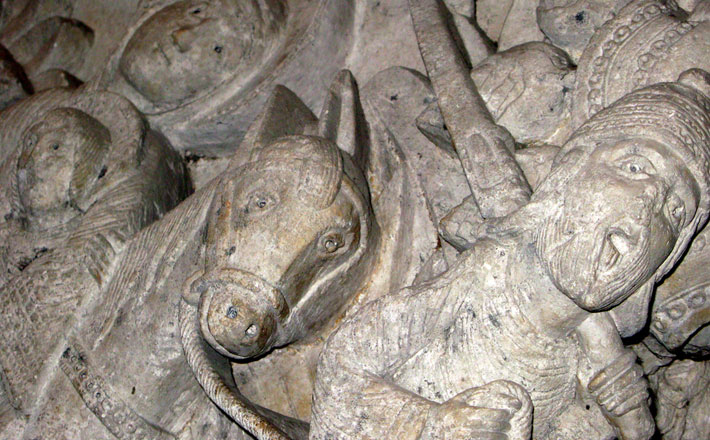Commentary on Matthew 2:13-18
Some churches today might opt for the Luke 2:22-40 story about Simeon and Anna’s joy over the dedication of Jesus.
Such a choice offers enormous treasures; it is good to remember those patient prophets, so glad to see the holy child at last.
But consider the rich paradox of celebrating the birth of Jesus, our redeemer, in the context of Herod’s slaughter of the Holy Innocents, as this day is often named. Setting Joseph’s dreams that saved the baby Jesus in the presence of “Rachel weeping for her children” locates the announcement of God-with-us in a believable universe because it is our own. Ours is a world pervaded by sorrows.
When Christmas comes in any year, refugees will still be fleeing some horror in their homelands. Powerful people will still be threatening the vulnerable. Death will continue to stalk the unsuspecting.
And into the madness of want and evil, God comes to give life, to show the way. For that reason, focus on the Holy Innocents on the First Sunday after Christmas is a strong way to proclaim the gospel. The image of salvation in the midst of cruelty is accurate. It is crucial rather than something to avoid. Do not be afraid of it. A shallow religiosity will not want to hear about the murder of children, but such horrors are not endured by failing to hear about them. What overpowers the bloody spectacles human beings create is the overwhelming truth that God gives not only a means for responding to evil but also a reason: God’s creation is holy, intended for good.
In addition, Matthew’s Gospel lets us focus on Joseph. He is given four crucial dreams in the first two chapters, and then we don’t hear about him any more. His role is not only to protect Mary and Jesus but to serve as one whose actions respond to God’s desire for Joseph’s little family’s safety. God speaks and Joseph listens.
We cannot avoid noticing that the parents of the children targeted by Herod do not receive an angel’s message. This, again, is a reality in our world, and it is a circumstance worthy of our prayer and mourning. We do not understand it. We must say that. Not everyone is saved from others’ evil deeds.
From the pulpit this might be a moment to speak directly to those who look at the evil in this world and conclude that God does not exist. These people are likely in worship on any given Sunday. They are each of us, as well as the consistently skeptical. The preacher might point to the evil that we see all around us (and within us) and name it for those for whom it is a stumbling block. Those whose image of God is Superman (a power always intervening) have little patience with the God who does not make life perfect for everyone. By their admirable zeal that the world be made right, they are, however, kept from seeing the goodness and beauty of God-made-human. This Jesus, born in the midst of Herod’s brutality, knows our suffering, comes to the frightened and the sick and the hungry, feeds and heals, and teaches the presence of God’s power wherever there are tears.
Christians do not worship a god who simply fixes problems. We worship the God who comforts those who suffer and who visits us with dreams and visions and insights as with Joseph.
Joseph’s first dream (Matthew 1) tells him not to abandon Mary. In the second dream (Matthew 2:13-14) an angel tells Joseph to take Mary and Jesus to Egypt or Herod will kill the baby. Third, an angel tells Joseph, the refugee in a strange land, that because Herod is dead, the family can safely return to Israel (Matthew 2:19-20). On the way, however, Joseph learns that Herod’s son — someone as brutal as his father — is the new ruler. He hesitates until a fourth dream assures him it is safe to bring his family to a new home in Nazareth of Galilee (Matthew 2:22).
On this Sunday we hear of only one of Joseph’s dreams. Yet, it embodies all the dreams Joseph received, all carrying the same message: Do not fear anything — not Mary’s pregnancy, not even the king. God’s steadfast love gives us visions that are often as unbelievable as something that comes in a dream.
Scientists tell us that dreams are the nervous system’s way of sorting out the experiences we have during the day. We need deep sleep in order to let various parts of the brain “talk” to each other. During sleep, our brains are at work revising our histories, storing the images we encountered in wakefulness, setting to rights the clash of experiences and feelings. Without good sleep, human beings can go mad. In sleep, when we are utterly vulnerable, limp, receptive, our lives get re-configured, put together in new and startling ways.
Dreams come when we no longer cling to social convention or hide behind niceness, when we are unconscious, when we are, in fact, dead to ourselves.
Perhaps that is why dreams are everywhere in scripture with angels (messengers) who bear the Word of God to those who need to hear. In the prophet Isaiah’s words, God “lifted them up and carried them all the days of old.” God’s word of rescue sets us on a journey toward what is whole and healed. At the fork in the road, we receive an unexpected directive (go to Egypt and then to a new home in Galilee).
We don’t know Joseph completely, but we know him well enough, because in just the way God’s messenger spoke to him, God speaks to us — in inklings, love, inspiration, insight, empathy, and even disgust.
Joseph understood where he ought to stand: alongside those who are in trouble. He guarded the ones in need of being lifted up.


December 28, 2014